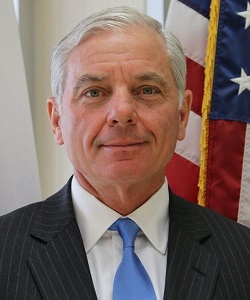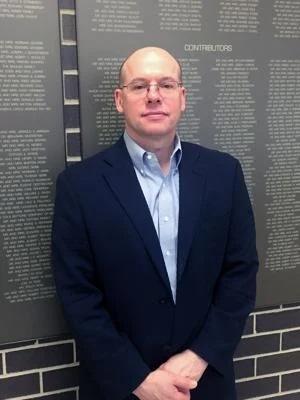Partnerships, Security Training Key to Safety
JANE KAUFMAN | STAFF REPORTER
Article reprinted with permission from Cleveland Jewish News
Local police departments in the eastern suburbs of Cleveland credited the Jewish Federation of Cleveland for alerting them to a live hostage crisis in Colleyville, Texas, Jan. 15 just before noon and stepped up their response immediately.

Hartnett
Lt. Mike Roberts of the Orange Police Department told the Cleveland Jewish News he was alerted by Jim Hartnett, director of community-wide security at the Jewish Federation of Cleveland.
“As you know, we share a close relationship with Jim Hartnett and his security team at the Jewish Federation of Cleveland,” Roberts wrote in a Jan. 18 email to the CJN. “He was in contact with our department and internally, we were monitoring the events surrounding the Colleyville incident.”
Roberts and others spoke of that partnership as being instrumental in their quick response.
“They’re keeping us abreast of any new developments,” Cleveland Heights Police Chief Annette Mecklenburg told the CJN Jan. 17. “But in the meantime, I did let them know that we are increasing our visibility in those areas and keeping an eye on things.”
Beachwood police officer Jamey Appell spoke similarly, saying the Federation requested additional patrols and that officers in Beachwood were “more vigilant.”
“We always do when an incident happens,” Appell told the CJN Jan. 17. “We always beef up the patrols at all of the Jewish facilities.”
University Heights Lt. Todd Kinley said Mayor Michael Dylan Brennan, Police Chief Dustin Rogers, Lt. Mark McArtor and shift commanding officers "were all in constant contact" with Hartnett and "were responding in real time."
"Everything was being coordinated as it was happening with increased patrols," Kinley told the CJN Jan. 18.
Hartnett also spoke of the importance of those partnerships, praising the immediate response local police made – and the two-way communication that leads to enhanced security at times when a Jewish institution and lives are under threat – even if the situation is occurring hundreds of miles away.
“We were obviously very engaged this weekend, even here in Northeast Ohio, due to that unfortunate incident in Texas,” Hartnett told the CJN Jan. 18. “We have enhanced security measures already throughout the community.”
Training, he said, plays a critical role as well – both for community members and for those empowered to protect them.
In fact, within the past several weeks, the Federation held a drill at a Greater Cleveland school in which the scenario happened to be an active hostage crisis.
Members of the Jewish community took part, as did the Beachwood Police Department, the Eastside Department Group Enforcement SWAT Team, the FBI and the Heights Hillcrest Communication Center.
“The more we can create this culture of security, the better we’re protected,” Hartnett said.
The Secure Community Network, the official safety and security organization for the Jewish community in North America, has announced a new training called ‘BeAware,’ which is open to members of the Jewish community. A preview of that training is scheduled for 1 p.m. Jan. 27 online. Hartnett recommended anyone take part in that to help enhance their ability to protect themselves.
In the meantime, the Federation will continue its work with training and assessments in local Jewish institutions.
“We’re constantly reassessing security,” Hartnett said. “It’s a day-to-day focus of ours. Because you can’t be complacent.”

Deutsch Burdman
In Youngstown, Rob Elston, Youngstown Area Jewish Federation’s security director, received “detailed and regular updates” from SCN as well as from his colleagues at the Ohio Regional Intelligence Center during the hostage crisis, according to a statement from Bonnie Deutsch Burdman, co-interim CEO of the Youngstown federation. Elston was also in contact with the Youngstown Police Department, the Liberty Police Department, the Boardman Police Department and his security team at the Jewish Community Center of Youngstown.
“We are grateful for law enforcement and the coordinated response of so many local, state, and federal agencies,” the Jan. 16 statement reads. “We continue to keep those involved in our thoughts and prayers.”
In Akron, John Kevercamp, vice president of the Jewish Community Board of Akron and executive director of the Shaw JCC, said as he saw what was unfolding on Jan. 15, “Our immediate response was to contact our local police department and ask them to step up patrol in and around the JCC, particularly because we have a synagogue on campus.”

Kevercamp
He also credited local police and that Hartnett has been supportive to the Akron Jewish community.
“We do have security on campus,” he told the CJN Jan. 18. “Times like this you always look at it a little bit closer. … We do training for campus staff and we have more training scheduled even prior to this event.”
In Columbus, Justin Shaw, senior director of community relations at JewishColumbus, said JewishColumbus remains in constant contact with local law enforcement agencies.
“On an ongoing basis we look for ways to improve upon tactics,” Shaw wrote the CJN in a Jan. 17 email. “In partnership with law enforcement, incidents like Saturday give us an opportunity to examine current practices.”
Shaw noted that Rabbi Charlie Cytron-Walker at Congregation Beth Israel in Colleyville, Texas, spoke of the importance of his own security training.
“To me, it is a strong signal that training works,” Shaw wrote. “And thanks to the strong partnerships we have with law enforcement – we have been able to conduct these same trainings for nearly two decades.”

Shaw
He also said JewishColumbus has made funding available to hire armed security at local Jewish institutions, partly through state and federal security grant funding.
“When you walk into services on a Saturday morning – you will be greeted by someone in uniform,” Shaw wrote in a Jan. 17 email to the CJN. “This remains the gold standard in protection – having a trained officer who can respond instantly.”
Hartnett recommended synagogues and Jewish institutions lock their doors at all times and he recommended that Jewish institutions build lasting partnerships with local police departments, allowing walk-throughs of buildings and ensuring that local police have floor plans of their buildings as one of many precautions.
“I’ve got a picture I keep that I saved from the attack in Halle, Germany, on Yom Kippur back in 2019,” Hartnett said. “And if you look at the picture, it shows that the terrorist fired multiple rounds into the door to try and get into the synagogue where 50 people were basically taking cover. And the one thing that saved them all was the door was locked.”
Columbus Bureau Chief Stephen Lengal contributed to this story.

![[image]](http://access.jewishcleveland.org/images/ad_cemetery_db.jpg)
![[image]](http://access.jewishcleveland.org/images/ad_new_to_cle.jpg)